The Inequality Virus: COVID's Impact on Jobs & the Economy
Create Your Resume Now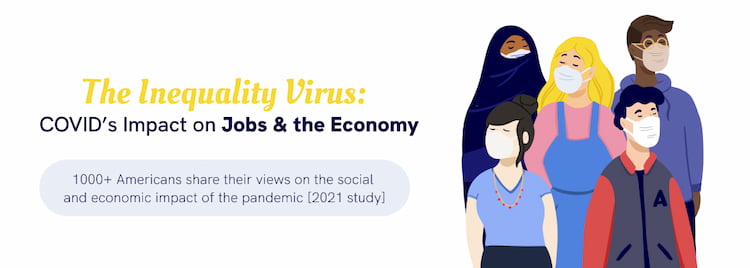
Months after the most divisive presidential election in living memory, America remains divided along multiple fault lines. Differences in wealth, politics, gender, age and race combine to create stark polarization and inequality.
It’s tempting to think that the coronavirus pandemic might act as a great leveler. A societal shock so powerful that its after-effects reduce inequality. The Black Death, a pandemic which wiped out a third of the population of Europe, had this effect in the 14th century. The cataclysmic horrors of the First World War did the same 600 years later.
But the black swan event of the pandemic already appears to be a harbinger not of reduced inequality but of a greater fracturing of a divided society. So to explore this further we’ve asked the American public about their views and opinions on the divisive impact of COVID-19.
We looked at issues surrounding jobs, the broader economy and government intervention. Our findings unearthed some disturbing attitudes, some of them starkly at odds with the reality on the ground. These views have the potential to hinder recovery and the responses themselves reflect the divisions that have become endemic in American society.
Job Losses—Whose Fault Is It Anyway?
Perhaps the most obvious of the economic impacts of the pandemic has been substantial job losses. The first cut was the deepest, with 22 million jobs lost from February to April 2020. A rapid but only partial recovery followed and by the end of 2020 there were still 10 million fewer jobs than there were a year previously.
So the causes of those job losses are pretty obvious right? A sudden and violent shock to the economy and society. And that then leads us to the conclusion that if you lost your job it was just rotten luck due to circumstances beyond your control, right? Not so fast.
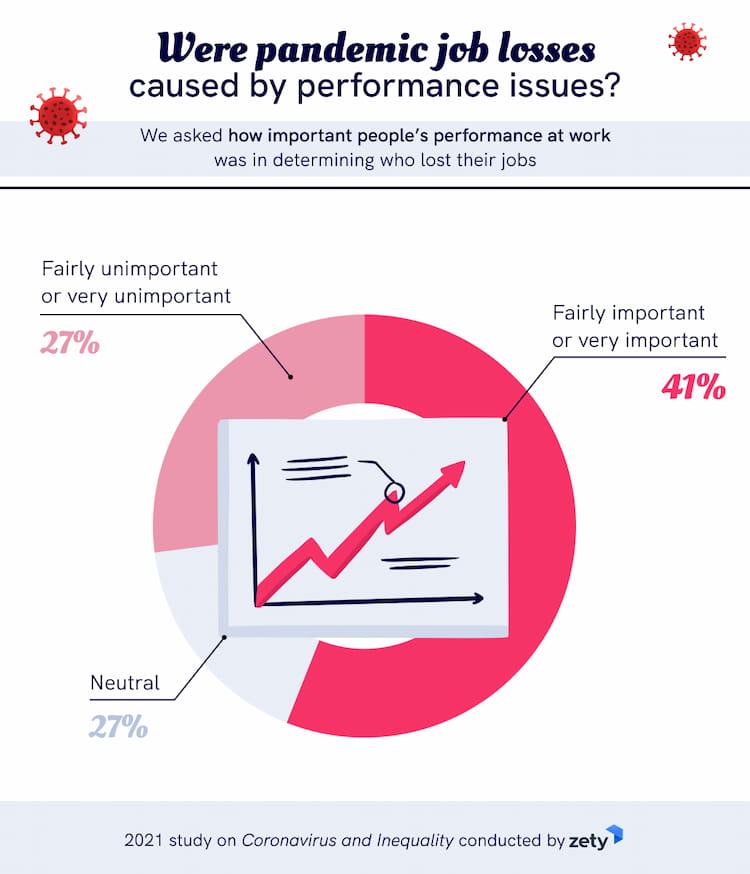
Four out of ten respondents agreed that individual performance at work was either fairly important or very important in determining who lost their jobs. And only 27% considered individual performance to be fairly or very unimportant in determining job losses.
To put it another way, 40% of people think pandemic job losses were your own damn fault for not performing at work. The events of the past year have been driven by circumstances beyond our control but attitudes to them are both divisive and dismissive.
As a starting point it certainly doesn’t bode well for any potential shift in societal attitudes towards increased solidarity and decreased inequality. In fact, our findings have shown that there’s a gulf between people’s opinions and the realities of the pandemic’s economic impact.
Here’s what we discovered when we took a deeper dive into this fraught topic.
Us & Them—Attitudes on the Pandemic’s Impacts on Economic Inequality
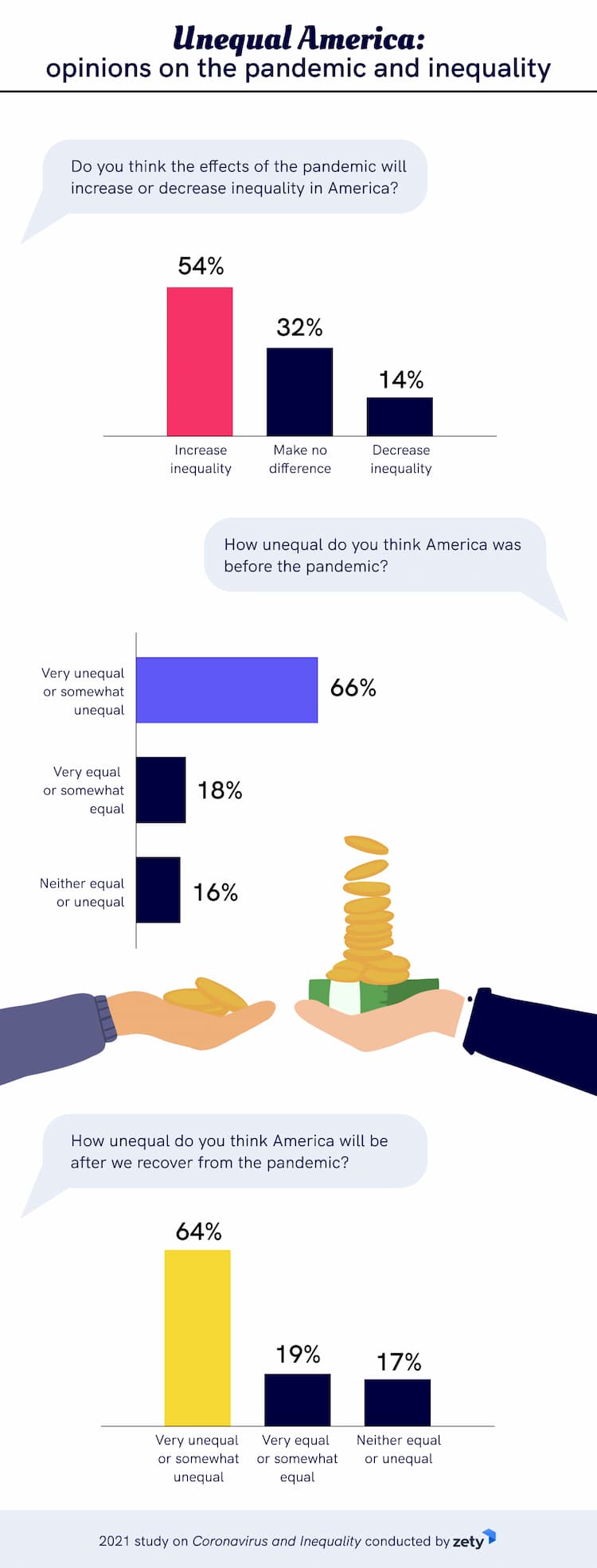
We wanted to examine views on whether economic inequality will increase as a result of the pandemic. So as our starting point we took the temperature on general opinions surrounding this premise.
There was a pretty even split between those who thought the pandemic would increase inequality, and those who thought it would decrease it or make no difference. Here are the numbers.
- Increase inequality—54%
- Make no difference—32%
- Decrease inequality—14%
As for broader views on whether America was an unequal society to begin with there was a clear majority who thought it was. 66% of respondents agreed America was unequal before the pandemic.
The figures were virtually identical when we asked how unequal America would be after the pandemic. That might seem a little odd at first glance. But with opinions on whether inequality will increase or decrease evenly split, it appears that this cancels out any significant differences in opinions on inequality in the future.
As for the reality? The data clearly shows that we live in an unequal society with increasing inequality, even before the pandemic is taken into account. In figures released by the Pew Research Center immediately before the pandemic struck, the years following 1970 showed an increase in the gap between upper-income earners and the rest of society and a decrease in the overall share of wealth held by those in the middle.
Again, that’s from data collected before the pandemic hit. But even in the midst of the crisis and before the full extent of the damage is understood it’s becoming increasingly apparent that the gap between the haves and the have-nots is growing even wider.
Importantly though, inequality is a multifaceted issue and covers differences between many different groups, so that’s what we examined next.
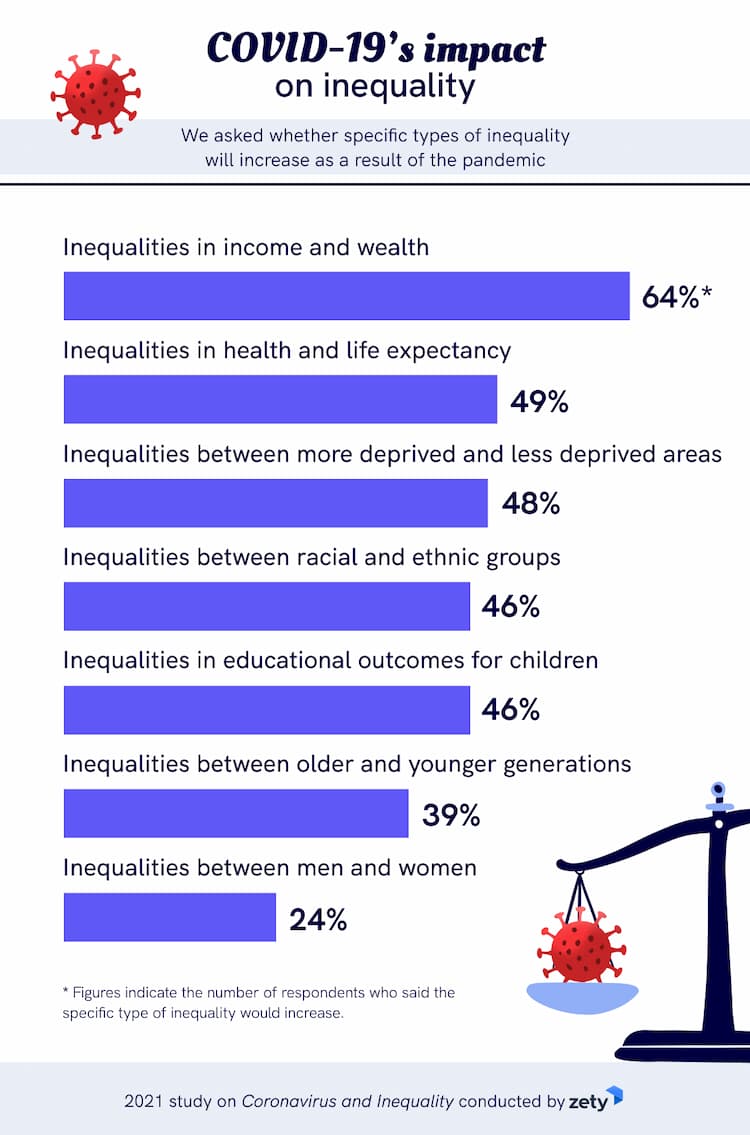
We wanted to examine some of the hot button types of economic inequality. So we asked our respondents whether they thought there’d be increases in inequality based on key measures.
To our surprise there was only one indicator where a clear majority of respondents thought inequality would increase. 64% agreed inequalities in wealth and income would surge.
When it came to health and income, deprivation, racial groups, and educational outcomes opinion was more evenly split. But the real shocker came when we looked at opinions on gender inequality. Less than a quarter of respondents agreed that inequalities between men and women would increase.
We’ve already established that there’s a proven trend towards worsening divides in wealth and income, even before the pandemic is taken into account. So the majority opinion is firmly rooted in fact. As for the other measures though, there’s a real disconnect between much of public opinion and objective reality.
Only 46% of respondents agreed that inequalities between racial and ethnic groups would increase. But in reality the evidence already shows that Black and Hispanic workers face increased economic insecurity.
Data from the Economic Policy Institute shows that losses of employment were clearly greater for Black Americans than White Americans. This has been supported by research conducted by other bodies, including The Hamilton Project, which showed that Black and Hispanic workers were more likely to experience periods of joblessness due to the pandemic.
This harsh reality has even led experts to refer to a “K-shaped recovery.” This is where outcomes will diverge, just like the arms of a letter “K,” with privileged groups experiencing improvement and the less privileged a continued decline.
But now, let’s go back to gender inequality. More than three-quarters of respondents were of the opinion that inequality between men and women wouldn’t increase. The reality is though that it already has.
More women workers lost their jobs due to the pandemic because there are more women in the industries worst affected, such as retail and hospitality. To put it into numbers, McKinsey & Company, America’s pre-eminent management consulting firm, estimates that women’s jobs are 19% more at risk than male ones. What’s more, only 47% of women had the ability to work from home compared to 62% of men.
Even those women who could work from home struggled with productivity as they took on the bulk of childcare and homeschooling caused by school and daycare closures. And this has had a brutal impact not just on women themselves but on the whole global economy.
Waiting until the pandemic has subsided would reduce that net gain to $5 trillion. And take no action at all and you’d potentially have global GDP growth that’s $1 trillion lower in 2030. So apart from the unacceptable morality of gender inequality there’s a lot to be gained from nipping this damage in the bud.
And we can’t do that effectively when the vast majority of the population fail to even recognize the problem.
Our data also revealed some interesting splits based on political partisanship. Here are a few notable correlations
- 20% of Republicans believed that the pandemic has affected the wealthy the same as it has the less wealthy compared to 8% of Democrats.
- 52% of Republicans believed that the pandemic has affected all races equally compared to 31% of Democrats.
- 65% of Republicans believed that men and women were equally impacted compared to 46% of Democrats.
So the reality faced by Republican policymakers in particular is rather different from the perception of their constituents. Sound, data-driven decisions need to be made to repair the damage the pandemic has caused and in many cases they’ll have to go against the grain of public opinion.
Speaking of which, we also asked our respondents what they thought about increasing income gaps between different groups. Is this a problem, or something they’d be prepared to live with?
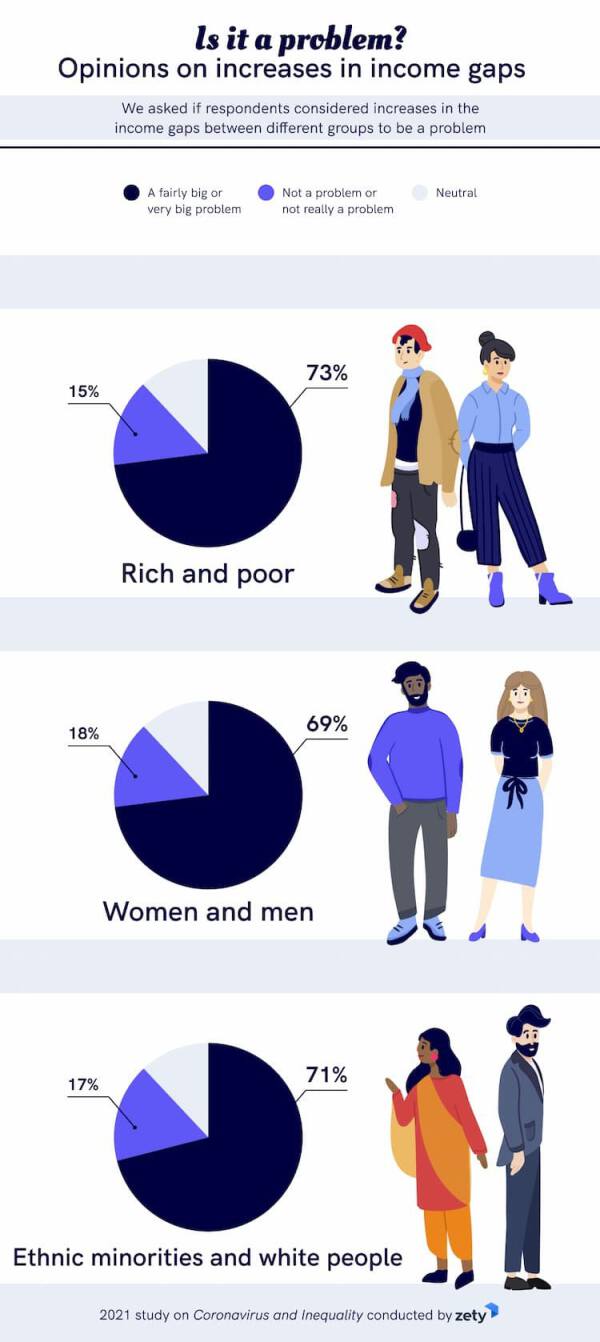
Again, our findings were disturbing. In each case, around 3 in 10 respondents did not view increasing income gaps as a problem.
And again, looking at responses based on political affiliation revealed marked differences in opinion.
- 41% of Republicans didn’t think an increasing income gap between rich and poor was a problem compared to 19% of Democrats.
- 44% of Republicans didn’t consider an increasing income gap between men and women to be a problem compared to 28% of Democrats.
- 44% of Republicans didn’t believe an increasing income gap between ethnic minorities and White people was a problem compared to 20% of Democrats.
Let us be clear this isn’t intended as a partisan attack, we’re just reporting the facts. But we’ve already examined the purely financial cost of failing to address gender equality, and failure to address other forms of economic inequality has consequences too.
Once again, McKinsey has crunched the numbers and put a dollar value on closing the racial inequality gap. And it should be noted that these figures were calculated before the pandemic.
So even shorn of politics, emotion and morality, the pure numbers show that reducing inequality makes sense. But large sections of the American public are simply not on board. Clearly, more needs to be done to inform them of the hard, unvarnished truth of letting this pandemic drive a wedge between different groups in society.
Which raises the question, what challenges in public opinion will governments face in taking measures to address pandemic-driven inequality?
Don’t Tread on Me—Attitudes on Government Intervention
We’ve looked at public perceptions of inequality and the economic and job-related impacts of the coronavirus pandemic. We’ve seen that there’s a widespread failure to understand the harsh realities of the damage this inequality has caused, and will cause moving forward if no action is taken.
And to take that action it’ll involve concerted efforts from the public at large, private corporations and perhaps most importantly, governmental intervention. So what’s the general opinion on government action during this time of crisis? Here’s what our respondents told us.
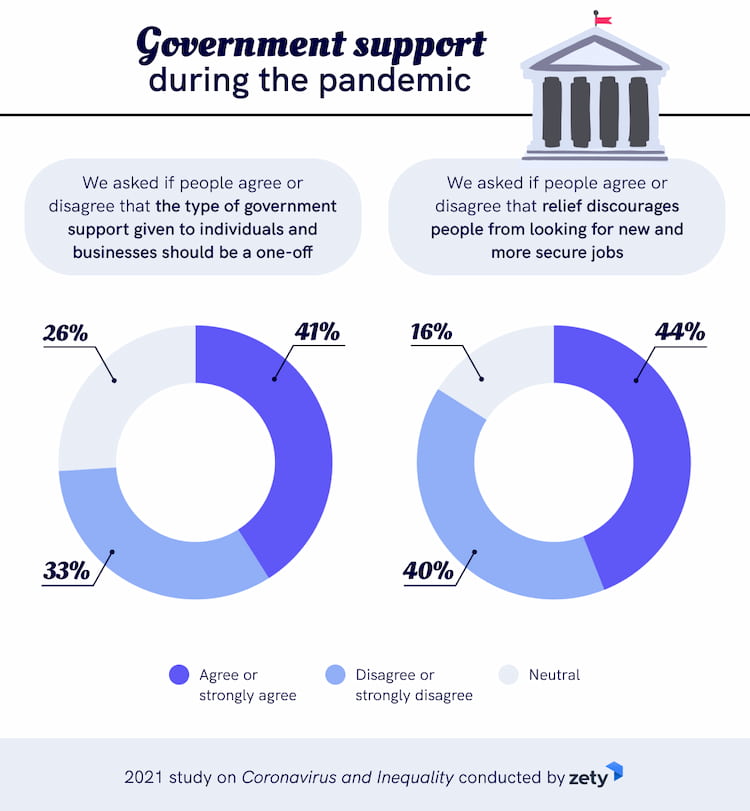
The most striking takeaway is that only a third of our respondents felt government support should be more than a one-off. On the other hand, 67% agreed or strongly agreed it should be a one-time event, or were neutral on the subject.
We also discovered that the population is pretty evenly split on whether relief discourages people from looking for new and more secure jobs, 44% in the agreed it does to some extent and 40% felt it doesn’t.
This aspect of the discussion is also where we saw our strongest correlations between political affiliation. To reiterate, the facts are that the pandemic has increased inequality. It’s well-evidenced and supported by reliable data. But do people believe the pandemic has increased the need for the government to address economic inequality? Here’s how they were split.
We also wanted to pin down views on government relief measures to address loss of income due to the pandemic. So we asked respondents to pick which of the following two statements was closest to their views.
- Relief measures are essential to protect people’s livelihoods.
- The government shouldn’t interfere, the economy should be left to adjust itself.
And the results?
- 73% of Democrats believed that relief measures are essential compared to 46% of Republicans.
- 37% of Republicans agreed the government shouldn’t interfere compared to 21% of Democrats
These are exactly the sort of splits in opinion we’d expect between the two ends of the mainstream political spectrum. We get it, these are ingrained views and it’s understandable that people cling to their beliefs.
But we’re facing an exceptional crisis in terms of jobs, the economy and increasing inequality. Doing nothing will come with a hefty price tag—a huge hit to future growth. It may be a bitter pill to swallow for some, but action is needed to make America and the world stronger in the face of this current adversity.
Action is needed. But public opinion could drain the political willpower needed to repair the crippling damage wrought by the pandemic and create one nation, indivisible, with liberty and justice for all.
Conclusion
Ultimately, the most concerning aspect of our findings was that the reality of the pandemic’s impact on economic inequality has not sunk in for many members of the public. There’s clearly a tendency to blame the individual for job losses rather than the broader effects of the pandemic on the economy.
There’s also a failure to recognize that inequality is increasing between different groups and a lack of willingness to allow government action to address the economic impacts of the pandemic. And this is in the face of reliable evidence that shows the potential for massive economic losses in future if no action is taken.
From both a purely humanistic and purely economic perspective, the impact of the pandemic on inequality is real and has the potential to cause ongoing damage. We hope our findings will act as a wake-up call to educate the American public and get them on board, regardless of their politics and beliefs.
Creating a future with the best possible outcomes for jobs and the economy will require bipartisan support and willpower. Let me put it this way, the ball for a successful post-pandemic future is in our grasp and if we work together as a team we can score a heck of a touchdown. Let’s not fumble by failing to grasp both the gravity of the situation and the action needed to address it.
Methodology & limitations
The findings presented were obtained by surveying 1000 Americans using Amazon’s Mechanical Turk. Respondents were asked questions relating to the impact of the COVID-19 pandemic on jobs and the economy. These included yes/no questions, scale-based questions relating to levels of agreement with a statement, and questions that permitted the selection of multiple options from a list of potential answers.
Some questions and responses have been rephrased or condensed for clarity and ease of understanding for readers. In some cases, the percentages presented may not add up to 100 percent; depending on the case, this is either due to rounding or due to responses of “neither/neutral/unknown” not being presented.
As experience is subjective, we understand that some participants and their answers might be affected by recency, attribution, exaggeration, self-selection, non-response or voluntary response bias.
This study was inspired by the work carried out in the study Unequal Britain conducted by the Policy Institute at King’s College London, in collaboration with the UK in a Changing Europe, to inform the Institute for Fiscal Studies Deaton Review of Inequalities.
Sources
- Antipova, T., “Coronavirus as a Black Swan Event”
- Duffy, B., Hewlett, K., Hesketh, R., Benson, R. and Wager, A., “Unequal Britain: Attitudes to Inequalities after Covid-19”
- Gould, E. and Wilson, V., “Black Workers Face Two of the Most Lethal Preexisting Conditions for Coronavirus—Racism and Economic Inequality”
- Horowitz, J.M., Igielnik, R. and Kochhar, R., “Trends in Income and Wealth Inequality”
- Maciolek, A., “COVID-19, Economic Mobility, Racial Justice, And the Middle Class”
- Madgavkar, A., White, O., Krishnan, M., Mahajnan, D. and Azcue, X., “COVID-19 and Gender Equality: Countering the Regressive Effects”
- Moss, E., McIntosh, K., Edelberg, W. and Broady, K., “The Black-White Wealth Gap Left Black Households More Vulnerable”
- Noel, N., Pinder, D., Stewart, S. and Wright J., “The Economic Impact of Closing the Racial Wealth Gap”
- Stevenson, S., “The Initial Impact of COVID-19 on Labor Market Outcomes Across Groups and the Potential for Permanent Scarring”
- U.S. Bureau of Labor Statistics, “Employment Recovery in the Wake of the COVID-19 Pandemic”
Fair Use Statement
Want to share our content? We’d love you to. All we ask is that you link back to us and give our authors full credit.
About Us
Zety has resources for all kinds of candidates looking for successful employment. From job-specific guides like how to write a project manager resume to more general help, including resume samples, professional resume templates, and tips on uploading your resume to LinkedIn.
About Zety’s Editorial Process
This article has been reviewed by our editorial team to make sure it follows Zety's editorial guidelines. We’re committed to sharing our expertise and giving you trustworthy career advice tailored to your needs. High-quality content is what brings over 40 million readers to our site every year. But we don't stop there. Our team conducts original research to understand the job market better, and we pride ourselves on being quoted by top universities and prime media outlets from around the world.
